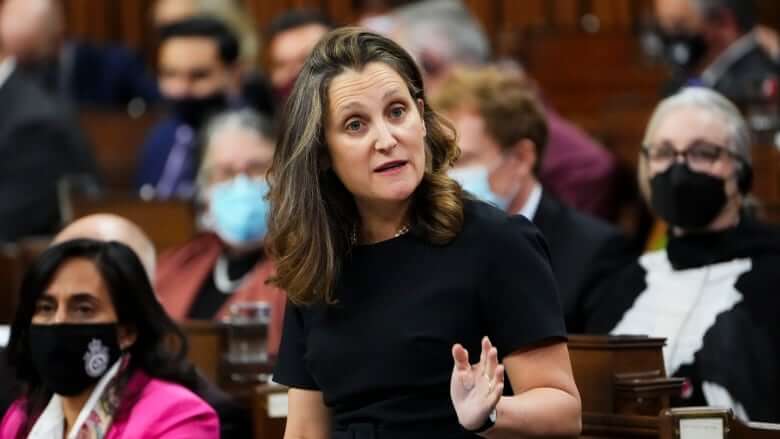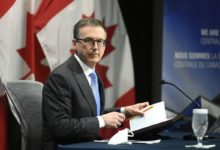Freeland to deliver fiscal update Dec. 14 amid B.C. flooding, U.S. trade woes, record inflation

Finance Minister Chrystia Freeland will release her fall economic and fiscal update on Dec. 14.
The announcement comes as inflation continues to plague the economic recovery in Canada and other developed countries, with the price of everything from food to energy rising at rates not seen in decades.
It also comes as Freeland faces a struggle to get her bill extending pandemic supports through Parliament before the Christmas break.
Talks have been underway between the government and opposition parties to expedite Bill C-2, which was introduced last week in the Commons and would provide more than $7 billion in additional pandemic benefits.
The NDP and the Conservatives insist they will not fast-track the legislation through the Commons and have called on the Liberals to swiftly reform parliamentary committees so that MPs can study the bill.
A motion was passed in the House of Commons earlier today that would see the Commons finance committee reconstituted to consider Bill C-2 no later than Monday, Dec. 6. The same vote also brought back the other committees of the House of Commons.
As a part of the motion, Freeland is to appear before MPs during the consideration of Bill C-2 to make a statement and take questions from MPs for no less than two hours.
The Conservatives say they want Freeland to appear before committee to answer questions about existing pandemic supports going to criminals and prisoners.
The New Democrats say they want changes to the legislation to protect workers who can’t claim employment insurance and don’t qualify for the proposed lockdown benefit. The party also wants the Liberals to make changes to prevent clawbacks of the Guaranteed Income Supplement for low income seniors who accepted pandemic benefits over the past 18 months.
Inflationary challenges
Freeland is also facing difficult economic circumstances. Statistics Canada says Canada’s inflation rate jumped to a new 18-year high of 4.7 per cent in October, led by sharply higher prices for energy.
A year ago, the inflation rate in Canada was 0.7 per cent.
When the cost of energy is taken out of the calculation — leaving just the overall cost of consumer goods such as food, shelter, clothing, housing, health care and recreation — the inflation rate drops to 3.3 per cent.
While that number is still above the Bank of Canada’s inflation target of 2 per cent, it’s well below the 6.2 per cent inflation being experienced in the United States.
The rising cost of goods is only one problem facing Freeland as she prepares for next year’s budget.
Stock markets are seeing steady declines and global supply chains are not functioning as they were before the pandemic. In British Columbia, catastrophic flooding has destroyed roads and railways, causing billions of dollars in damage.
Meanwhile, the COVID-19 omicron variant is restricting international travel and threatening to send parts of the economy back into lockdown.
Trade challenges
U.S. lawmakers are putting the finishing touches on an infrastructure bill worth nearly $2 trillion. As it stands, the bill contains a new electric vehicle incentive that Ottawa says could undermine Canada’s auto sector and violate the new North American free trade agreement.
The proposed incentive would eventually give American buyers a $12,500 US rebate on the purchase of new electric vehicles, but only if the vehicles are produced in the United States.
The Canadian government argues that the incentive threatens decades of co-operation between the two nations in the auto sector and could lead to job losses on both sides of the border. Mexico also opposes the plan.
During a trip to Washington last month, Freeland said fighting the electric vehicle incentive will remain a top government priority.
“The way they have formulated this incentive really, really has the potential to become the dominant issue in our bilateral relationship,” Freeland said. “The EV incentives, as they are currently formulated, we are certain are a violation of the new NAFTA agreement.”








Redes Sociais - Comentários